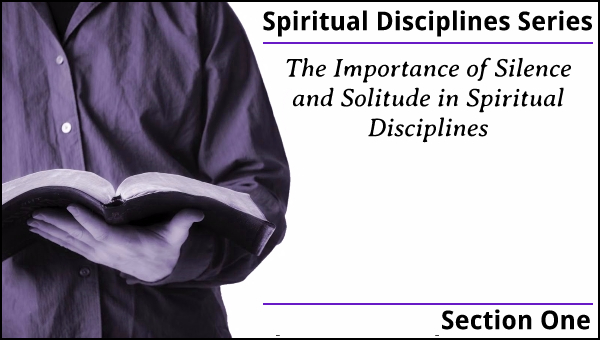By Tyson Thorne

After yesterday’s examination of Spiritual Formation and the Biblical teaching of discipleship, it seems appropriate to enter into an extended series that will teach us how to connect with God in new ways and expand our awareness of his work in our lives and world. These spiritual disciplines are organized into three sections, those that should be performed in solitude, those performed in community, and those that are personal disciplines. We will conclude by examining what fruits we can expect from these practices, fruits that will make us fit to echo Paul’s sentiment, “Be imitators of me, as I follow Christ” (1 Corinthians 11.1).
Now it was during this time that Jesus went out to the mountain to pray, and he spent all night in prayer to God.
Before selecting the 12 disciples he would be closest to and live the next three years with, Jesus sought some alone time with the Father. Throughout the gospels, we see Jesus escaping the crowds to seek some down time, but for him that wasn’t watching a football game, listening to Pandora, or reading a new book on his Kindle. Instead, he sought solitude in a quiet place, where he could give his full concentration to prayer. Silence and solitude is an important part of our spiritual journey, too.
Churches organize retreats, a time of getting away from our jobs and families so that we might enter into times of silence, as well as community, for our spiritual enrichment. This is a good thing, but it is not enough. Even the most extroverted among us need regular time of silence and solitude, time to devote ourselves prayer, hearing from God through his Word, worship and journaling. There is no magical formula for how frequently or how long such times are to be, but their necessity is not in dispute.
As mentioned above, Jesus practiced this regularly, and usually before major decisions and events. The apostle Paul recommends married couples separate – only for a limited time – to pray ((1 Corinthians 7.5). This separation is less than a day; Paul also tells us to not let the sun go down on our anger, indicating this period of solitude is measured in hours. The purpose is to pray, meaning it’s not to go consult friends down at the pub. This is an instruction to seek solitude, to go to God with our concerns, so that one may return to their spouse and reconcile. Any time our problems start to loom, seeking silence and alone time with God is always the right move.
In the days to come we’ll talk about what that time should look like, but first it is important to recognize the dangers of spending too much time alone. The Bible never instructs us to live in permanent solitude, or to live a monk-like existence. Just as there is a time for solitude there is also a time for community. The Guinness Book of World Records has determined that the world’s most quiet room is found at Orfield Laboratories in Minneapolis, Minnesota. The room absorbs 99.9 percent of all sound. It has been observed that a person can only spend 45 minutes in such silence before the onset of clinical insanity. Too much silence is dangerous, both for people and their communities.
Such silence is hard to come by in our world, and that kind of silence is unnecessary anyway. Seeking a place of quiet solitude, free from distraction is the goal here. A place where we can find and keep our focus not on our problems, but on the God who is big enough to overshadow them. Spend some time now identifying places at home, at work or school, that are available for such times.
|
|
